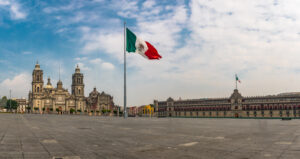Select Language |
Published February 4, 2022
Read Time
Published February 4, 2022
Read Time
Personal relationships, loyalty, strong hierarchy, and status consciousness are dominant characteristics of Mexican business culture.
The work etiquette is not too different from that of other Latin American countries. However, Mexico’s proximity to the US and the strong trade ties between the countries have also shaped the business culture.
Personal relationships play an essential role, to a point where the impression you give and the level of relationship you maintain with your local counterparts can override your business proposal. In my view, the biggest single difference in approach to business between Mexico and the USA or Canada would be the much greater emphasis placed on the value of personal relationships within the business cycle.
Mexicans usually spend much time and effort in relationship building and getting to know those with whom they do business. Networking is a big feature of this process, and it is not done without intent. Covid-19 has had an impact on this requiring both Mexicans and their international counterparts to adapt but you should never underestimate the importance of personal relationships in this market.
 Mexican Business Communication
Mexican Business CommunicationAlthough English is increasingly widely spoken in Mexico, it would not be wise to assume that all business acquaintances will be fluent in the language. English language levels vary, and it is best to check in advance as to whether translators may be necessary. It goes without saying that you will be at a great advantage if you and/or your colleagues speak good Spanish. It will certainly pay off if you try to learn some Spanish as your Mexican business develops, since even a rudimentary command of the language will be seen as a sign of sincerity and respect.
It is advisable to confirm your appointment several times in advance as it is regarded as an eagerness to meet. I suggest that you develop a rapport with the personal assistants of senior officials as they can be very useful sources of market intelligence.
If face to face communication is not available, Mexican business contacts are more likely to talk over the phone or do virtual meetings rather than respond to emails.
LinkedIn is generally popular in Mexico. However, it isn’t used so much for networking as it is for hiring. WhatsApp is a preferred means of managing groups and messaging.
Mexicans tend to be status conscious and therefore it is recommended to book engagements in settings that reflect one’s position and status. If the first meeting with high-level representatives is set to take place outside the office, first-class hotels and restaurants are appropriate.
Mexico is a high context communication culture, so you need to be sensitive to the context of the situation and not focus so much on the spoken word. Mexican body language differs from North American and Northern European body language. People stand closer to each other and have far stronger eye contact than in many other cultures. It is important that you are not intimidated by these factors, as lack of strong eye contact or maintaining too great a distance could be misconstrued as standoffishness or untrustworthiness.
When it comes to business greetings, the proper practice is a handshake, regardless of gender. If a relationship is already developed or among business associates of the opposite sex, a kiss on the cheek is acceptable or a hug is common between close male friends. Mexican men and women are warm and friendly and make a lot of physical contact. They often touch shoulders or hold another’s arm. To withdraw from this touching will not position you well for building relationships.
Mexicans are generally more formal with names than are most Westerners. Mexicans have three names – their first name, their father’s last name and their mother’s last name. Use the father’s name when addressing your counterpart. Also note that titles are a big status symbol which should be used where appropriate before the name Lic. (Licenciado), Ing. (Ingeniero) Dr. (Doctor) etc.
Business cards are still readily exchanged so keep them handy to blend into Mexican business culture. It is also important to have your cellphone number on your card and don’t hesitate to ask for potential client’s cellphone numbers as well.
Mexicans are quite status conscious and successful people are expected to look successful. Dress is, therefore, of great importance and is vital to look smart in both business and social situations.
Given the importance of image and status, Mexicans dress formally for business meetings with suits and ties, and will expect you to do the same in the major cities (Mexico City, Guadalajara, Monterrey etc.) The exception to this rule is if you are meeting in a very hot region, a port or beach resort.
Remember that you are creating an image of yourself and your company in each meeting or interaction and you are being “sized up” in terms of the potential for longer term collaboration and success in Mexico. Westerners sometimes present themselves in a very casual manner so they may need to adjust a little depending on the nature of the Mexican company and counterpart.
As in many relationship–oriented cultures, business entertaining is a big part of the process. A lot of business meetings take place over breakfast and, more commonly, at lunch. Both breakfast and lunch meetings can be lengthy, lasting two hours or more.
There is no hard and fast rule concerning conversational topics over business meals. Sometimes business issues will be discussed other times they will not.
The family unit is central to Mexican society, with large family groups often spending holidays and most Sundays together. Family gatherings that stretch across several generations are characteristic of Mexican holidays. Western business people need to be sensitive to the priority of family to their counterparts, agents and employees and understand that accommodations are necessary.
Indigenous Mexican culture tends very much towards the hierarchical in both personal interactivity and the way in which business is structured. Accordingly in this scenario, Western businesspeople may expect that the Mexican firm will have a relatively centralized decision-making approach with all important decisions being made by a few key individuals at the top of the company.
The management style in traditional Mexican organizations tends towards the paternalistic as is often found in strongly hierarchical cultures. However, this does not mean that instructions can be given to subordinates with no concern being shown for their well-developed sense of honor. A good manager combines an authoritarian approach with a concern for the well-being and dignity of employees. Managers can be expected to be authoritative but not authoritarian.
As relationship bonds run deep in Mexican culture, the manager expects loyalty. In return for this loyalty, the boss will look after the interests of subordinates. The manager-subordinate relationship is viewed as reciprocal.
It is important to have someone on the ground getting the information that you need to understand the status of your project approvals, who will make the next decision and the timelines.
In doing business with organizations like Pemex or Comision Federal de Electricidad (CFE), international firms work on a tender basis but on the ground support to understand the conditions of bidding documents is crucial. Do not expect that you can fly into Mexico to obtain fully clarity on the status of your bid or the conditions and next steps. An effective local partner and senior level visits at the right time can do the job to set you up for success in Mexico.
Remember that long delays can occur due to lengthy holiday periods which Mexico is accustomed to, especially during numerous religious off work periods like Christmas, Semana Santa (Holy Week or the week before Easter), Our Lady of Guadalupe (Dec 12), Mother’s Day (May 10th or Dia de las Madres), Day of the Dead (Nov 2) Kings Day (January 6).
In Mexico long weekends or long off work periods are called “Puentes” (bridges) and there is a joke that the longest bridge in Mexico is the “Puente Guadalupe Reyes”. This is because it runs from December 12, the Day of our Lady of Guadalupe, to King’s Day on January 6. The fact is almost everything slows down over this holiday span. I can recall the challenges one faces to conclude business before the end of the calendar year – most often if a transaction is not signed before December 12, it will have to wait until January.
Although the USA has a large influence, both economically and politically, on the development of Mexico it is important to do some research into the factors that make the country so radically different from the other two North American countries before trying to do business there.
The biggest influence US business culture has on Mexico is probably in the large number of US multi-nationals who operate in the country and the business processes which follow in their wake. In northern states such as Nuevo Leon, the similarities in business practises and approach to those in southern US states such as Texas are quite striking.
 Regional Differences in Culture and Urbanization
Regional Differences in Culture and UrbanizationMexico is divided into numerous regions, each with distinctive histories, accents, and loyalties. Mexicans themselves carry many stereotypes and beliefs regarding characteristics of these regions. For example, people from Nuevo Leon are perceived as being very business-oriented and thrifty; people from Oaxaca may be proud of the influence of native Indian cultures, and so forth.
Mexico is often considered to have four regions from a cultural perspective namely:
1) The North (9 states where the cultural influence of the US is notable) 2) Central Northern (defined by its colonial past e.g., Guadalajara) 3) Central Mexico (dominated by the heaving metropolis of Mexico City) and 4) The South (historically the poorest region and home to many indigenous people).
In recent decades, many Mexicans have been attracted to Mexico’s urban centers in the search for jobs and opportunities. While all of Mexico’s major cities have seen influxes from the countryside, Mexico City—now one of the world’s largest cities—has grown at a pace unmatched anywhere in the industrialized world. Less dramatic but still major migrations of people to Monterrey and Guadalajara have also occurred. These magnet cities represent a major demographic shift for Mexico and break with traditional ties to region and family.
Mexico does not have an official religion. However, Roman Catholicism is the dominant faith and deeply culturally pervasive. It is estimated that over 80% of the population is identified as Catholic. Many Mexicans see Catholicism as part of their identity, passed on through the family and nation like cultural heritage.
However, not all Mexicans attend church services regularly. Religion is most visible in festivities, events, and the placements of idols throughout people’s homes and public places. You should keep in mind that even non-religious Mexicans still engage in Catholic celebrations. Accommodate this and realize the importance of religious holidays and family to your Mexican counterparts.
Although Mexico is often viewed as a machismo culture where a strong separation is made between the roles of men and women, visiting female executives will encounter few if any problems when doing business with Mexican male colleagues or clients.
Simple gifts may be exchanged as a gesture of good will after a first business meeting or at the conclusion of a transaction. Always be mindful of your corporate ethics policy and stick to the guidelines. Gifts from one’s company (i.e., a gift with the company’s logo) are appropriate for an initial meeting. If invited to a Mexican partner’s house, it is appropriate to bring wine, chocolate, or flowers (avoid marigolds and red flowers). It is recommended that you avoid giving items made of silver or tin given Mexico’s prominent role in producing high quality silver.
Don’t forget to provide a small gift to the top official’s executive assistant as he or she will appreciate it and can open doors for you.
Value-Mart, the hugely popular US chain, ventured into Mexico in 1991 – its first international move. It signed a joint venture with Ciera, a Mexican chain. Value-Mart essentially capitalized on Mexico as soon as the nation opened to global trade. In 1997, Value-Mart acquired majority ownership of Ciera and in 2000, became Value-Mart de Mexico. Around that time, it also became the largest retailer in the country. In 2007, Value-Mart de Mexico had already more than 1,045 stores and 155,000 employees (in fact, it accounted for 60% of food sales there).
 Globalization Practices of Value-Mart de Mexico
Globalization Practices of Value-Mart de MexicoWhen Value-Mart first entered the Mexican market, a string of management missteps and cultural conflicts caused it to incur significant net losses. Some of Value-Mart’s problems had to do with hubris – a uniquely powerful US behemoth trying to impose its blueprint worldwide.
Put simply, Value-Mart failed to glocalize and wanted to have an exact copy of its corporate culture in Mexico. At Value-Mart’s headquarters in Bentonville, Arkansas, the message from the performance in Mexico and other mishaps in other countries due to lack of appropriate adaptation to local cultures had been heard loud and clear.
In response to the problems in Mexico, Value-Mart adopted five glocalization strategies designed to improve performance, expand, and become the largest private employer.
An example of Value-Mart’s approach in this area, was their efforts in the southwestern- central highlands of Mexico. In this case, the company used the Zapotec language – a Mesoamerican language – in its stores to connect with local consumers. It hired Zapotec-speaking interviewers to make local applicants comfortable. Advertisements were broadcast in Zapotec by female speakers in traditional flowing skirts and ornate blouses.
A shopper walking into a Value-Mart store in Monterrey would notice that he or she must first pass-through rows of random goods (e.g., oranges, salad crackers, and flour) heavily promoted as cheaper than those of rival, Soriana. In Mexico, Value-Mart has applied an Every Day Low Price campaign whereby prices for many products are much lower than those in the US and those of other stores in Mexico.
In recent years, Value-Mart’s strategy for growth has been to promote the “no-frills” Bodega Aurrera format. Rather than rivaling with upscale supermarkets, Bodega Aurrera is intended to penetrate low-income and working-class communities and compete with small stores, urban markets, and informal retail. It is an austere, lower- end grocery chain, which Value-Mart adapted from its partnership with Ciera to reach out to consumers in middle-size and smaller cities of southern and central Mexico.
While there were instances of resistance in some locales as the Value-Mart stores impacted local merchants and culture, the protests petered out because most inhabitants wanted the store, and the prices were very appealing.
On the other hand, its Superama supercenters found in residential areas of Mexico City and suburbs concentrate on quality and convenience. Also, Value-Mart’s Suburbia apparel stores are designed for middle-income shoppers.
With the help of its computerized inventory and sales tracking system, Value-Mart employees and suppliers can gain access to everyday sales and inventory figures. With the system, they can decrease the transaction costs of many products that local consumers desire to purchase in convenient locations. Further, Value-Mart’s massive convoy of trucks and computerized logistics make it easy for the company to sell a microwave in rural towns as in Mexico City for the same price.
Value-Mart de Mexico has glocalized local employee practices in several important ways. For example, it has provided employee benefits like share and bonus plans, helping decrease turnover.
Another traditional Mexican employee practice adopted by Value-Mart is union organizing. In Mexico, Value-Mart employees work generally full time and are unionized, with, on average better wages in comparison with other retail chains and rather typical benefits.
All five glocalization strategies adopted by Value-Mart de Mexico have not only made it the largest retailer in Mexico; they have also allowed local communities to interact with Value-Mart’s hybridized culture. The result for Value-Mart de Mexico is a corporation that is different from the US model.
© Copyright 2025 Global Business Culture. All rights reserved | Legal Notices